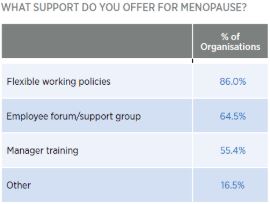Fit for the future: Menopause in the workplace
With the market for talented, experienced, and engaged staff being more competitive than ever, it is essential that your benefits package is fit for the future, aligned to the needs of your people and, importantly, able to grow and change with them.
Employees want to know that their employer recognises their individual needs and life stages, and provides benefits accordingly.
Menopause is increasingly recognised as a critical workplace issue. According to the 2023 CIPD report, two-thirds of women experiencing menopausal symptoms say it negatively affects them at work. Over half have taken time off due to symptoms, and 6% have left their jobs entirely because of a lack of support. A further 17% have considered leaving.
This often occurs when women are at the peak of their careers, with valuable experience and leadership potential. The organisational impact is significant loss of talent, increased recruitment costs, and setbacks in diversity, inclusion, and gender pay equity.
Adding urgency, the Employment Rights Bill passed in 2024, and the government has now published its roadmap for change. From April next year, Menopause Action Plans will be encouraged on a voluntary basis – but these will be made mandatory for large employers in 2027. This will shift menopause support from a best practice to a legal obligation.
How are companies responding?
Gallagher’s Workforce Trends Report shows growing awareness. However, only 63.7% of organisations report having a menopause policy, while just 24% of employees surveyed by CIPD are aware of one. This gap highlights a broader issue: internal communication remains a major challenge.

What more can be done?
Given the current challenges highlighted by the Workforce Trends Report around the increasing cost of benefits provision, it is important to highlight that there is much you can do at little or no cost.
1. Create and communicate a menopause policy: Having a policy is essential - but so is making sure employees know about it. Resources are available from organisations like Menopause in the Workplace, Fertifa, and the Equality and Human Rights Commission’s Guidance for employers. These can help you get started.
2. Train line managers: Line managers play a pivotal role. Many people still associate menopause only with hot flushes, but symptoms can include anxiety, fatigue, memory issues, and more. Training helps managers understand the full scope of symptoms, how to support affected employees, and how to maintain confidentiality.
3. Audit existing benefits: You may already offer support without realising it. A benefits audit can help identify and reframe existing provisions as menopause support. Examples include:
- Employee assistance programmes (EAPs): Often include counselling, CBT, and line manager support and training.
- Health cash plans: Typically cover consultations and diagnostics, including menopause-related care.
- Virtual GP services: Some offer specialist menopause support, and NHS prescription services.
- Private medical insurance: May already include menopause support.
- Provider webinars: Useful for HR and line manager education.
Before introducing new benefits, ensure you’re maximising what’s already available.
4. Empower employees and reduce stigma: Creating a menopause forum or support group can be a powerful step. It provides a safe space for employees to share experiences and advice, and signals that the organisation is listening. For example, many people are unaware of the HRT Pre-Payment Certificate, which costs under £20 annually and can significantly reduce prescription costs — especially since many HRT medications are charged as two prescriptions.
You can also:
- Offer menopause first aider training.
- Create a dedicated section on your intranet or benefits platform with links to internal resources, NHS support, and relevant charities.
Introducing targeted benefits
If you choose to invest further, the market now offers a wide range of menopause-specific benefit options to suit different budgets:
- Remove exclusions from existing private medical insurance.
- Pay-as-you-go consultations with menopause specialists, with optional follow-up support.
- Well-woman health screenings, employer or employee funded.
- Digital-first solutions: These range from educational platforms to full-service support with moderated groups and content, as well as prescription and screening services.
Supplied by REBA Associate Member, Gallagher
Gallagher is a global, integrated HR consulting, benefits administration & technology services provider.








